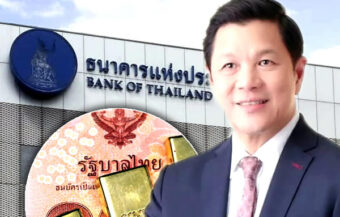Bank of Thailand cuts interest rates by 25 basis points in a surprise move. Stronger baht and muted inflation are thought to be key factors behind the decision, despite initial scepticism from most economic pundits. Governor emphasises future policy decisions will depend on economic conditions as they develop.
Despite catching the majority of financial pundits off guard on Wednesday with a surprise 25-basis-point rate cut, Bank of Thailand Governor Sethaput Suthiwartnarueput later emphasised that future decisions would be based on the country’s economic conditions, particularly inflation. Indeed, a Reuters poll of economic analysts previously saw only four out of twenty-eight predict the move, which was decided by a 5-2 vote by the Monetary Policy Committee. Before Wednesday’s decision, business leaders had asked for a cut to help alleviate the impact of the strong baht, which rose 14% in the third quarter.

On October 16, 2024, the Bank of Thailand (BoT) announced a surprise interest rate cut. This was the first reduction in over four years.
At length, the central bank’s Monetary Policy Committee (MPC) voted 5 to 2 in favour of the move. In brief, they lowered the key one-day repurchase rate by 25 basis points, from 2.50% to 2.25%. This rate had been at a decade-high of 2.50% since September 2023.
This rate cut is the first by the central bank since May 2020. At this time, it is unclear what prompted the change in the committee’s thinking. However, the strength of the baht may have influenced the decision. The U.S. Federal Reserve’s recent 50-basis-point cut might have also played a role.
Government lobbying for rate cut to boost struggling economy was key in BoT’s surprise decision
For months, the government had lobbied for a rate reduction. The Ministry of Finance had previously urged the BoT to lower borrowing costs to prime the economy. The aim was to stimulate the struggling Thai economy with cash saved from interest repayments.
The central bank recently appeared to acknowledge the benefits of an interest rate cut. A drop in rates improves cash flow for large indebted firms and, of course, for the government. However, it emphasised that economic growth continued to be stymied by chronic structural issues.
Economy growing as the Central Bank and Finance see eye to eye. However the threat of political instability is also
Finance Minister to meet Bank of Thailand boss. Seeks a revised inflation and interest rate policy for growth
The Ministry of Finance has also pointed out low inflation and slow growth in the economy.
Despite the government’s push, the BoT’s decision surprised many economists. Out of 28 economists surveyed by Reuters, only four predicted a rate cut. Most expected no change. The last change in the policy rate had been a 25-basis-point hike in September 2023. The most recent rate cut came during the pandemic crisis.
The BoT will hold its final policy meeting of the year on December 18, 2024.
Pressure from low inflation and strong baht drove government calls for rate cuts to support growth
The Pheu Thai government has been pushing for rate cuts to boost the underperforming economy. Ministers have cited inflation as one reason for this. Inflation has been below the BoT’s target range of 1% to 3% for months.
In August 2024, consumer prices rose only 0.35% year-on-year. This brought the year-to-date average to just 0.15%, reflecting a first-quarter contraction. The MPC expects inflation to return to the target range by late 2024.
The BoT’s decision follows Thai businesses struggling with high costs and a strong baht. The baht surged 14% in the third quarter of 2024. This has made Thai exports more expensive compared to competitors. However, the baht has weakened slightly in recent days, giving exporters some relief.
Sanan Angubolkul, Chairman of the Thai Chamber of Commerce, believes lower borrowing costs could help ease pressure on businesses. Firms are struggling with high operating costs and the strong baht.
Despite the rate cut, BoT Governor Sethaput Suthiwartnarueput emphasised that rate decisions will continue to depend on economic conditions and inflation forecasts. He warned that lower interest rates alone would not be enough to spur growth. Major structural reforms are still needed.
Household debt remains a challenge, though BoT sees small rise in 2024 economic growth forecast
High household debt, which stands at 91% of gross domestic product (GDP), remains a serious issue. The central bank has cited this as a reason for its cautious approach. While the rate cut may ease some debt burdens, the BoT remains committed to long-term financial stability.
The BoT slightly raised its 2024 economic growth forecast, from 2.6% to 2.7%. However, it trimmed its 2025 forecast from 3.0% to 2.9%. The World Bank expects Thailand to grow by 2.4% in 2024 and 3.0% in 2025.
Key growth drivers include tourism, private consumption, and government stimulus measures. Export demand for electronic products has also supported growth. However, recovery has been uneven across sectors. Some areas, such as merchandise exports and manufacturing, still face challenges from structural issues.
Headline inflation is projected to be 0.5% in 2024 and 1.2% in 2025. Fresh food prices are likely to rise due to weather-related volatility. Energy inflation may also increase due to base effects. Core inflation, which excludes food and energy, is expected to stay low at 0.5% in 2024 and 0.9% in 2025.
BoT continues to monitor credit quality decline as some borrowers still struggle after earlier assistance
The BoT also highlighted concerns about declining credit quality. Many debtors who received financial assistance in the past are still struggling. SMEs and households with slow income recovery are particularly at risk. Business loans have not only slowed but contracted, especially in hire-purchase and credit-card loans.
To address these issues, the BoT supports targeted debt restructuring efforts. These aim to reduce household debt and avoid a broader decline in economic activity. The central bank is focused on maintaining credit quality while ensuring the overall economy remains stable.
Although the rate cut may satisfy some critics, concerns about political influence over the BoT persist. The government reportedly supports former Commerce Minister Kittiratt Na-Ranong for the role of the next BoT chairman. He has been critical of the BoT’s previous hawkish stance. This raises questions about the future independence of the central bank.
The choice of the next BoT governor will be closely watched. It could have significant implications for Thailand’s monetary policy in the years to come.
Steady as she goes, business as usual, is the message
After Wednesday’s decision, the press heard from Mr. Sakkapop Panyanukul, Assistant Governor of the Monetary Policy Group, Bank of Thailand (BoT), and Secretary of the Monetary Policy Committee (MPC).
Certainly, the central bank official referred to ongoing discussions between Bank of Thailand Governor Sethaput Suthiwartnarueput and Minister of Finance Pichai Chunhavajira.
The message was clear. In short, today’s decision was business as usual and steady as she goes from the bank. Certainly, no sea change in policy, simply a response to economic conditions and data.
“We need flexibility. If we are afraid of low inflation, why are we afraid? We are afraid of the risk of deflation. People will not go to spend. But we do not see that yet. If inflation is too high, we see the disadvantages. The cost for entrepreneurs will increase. The cost of living, even though the current inflation figure is low, is already rising. And the price level is already high,” said Mr. Sakkapop.
Join the Thai News forum, follow Thai Examiner on Facebook here
Receive all our stories as they come out on Telegram here
Follow Thai Examiner here
Further reading:
US Federal Reserve rate cut piles pressure on Bank of Thailand and its governor who is holding firm
Central bank holds interest rates. Economy will grow 2.6% in 2024 as Srettha pushes home ownership
Economy unlikely to grow in first quarter as Thai manufacturing crumbles. Hard choices ahead
New Finance Minister expected in April as economic malaise deepens with downgrades in GDP growth


















